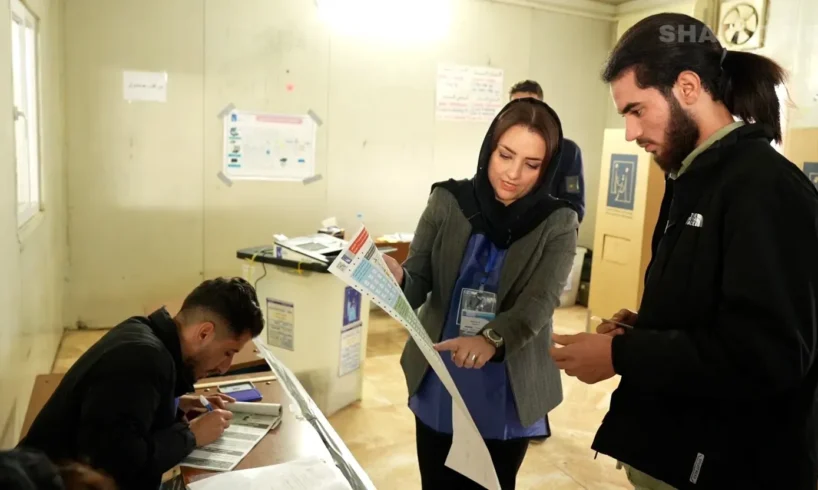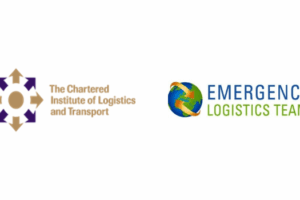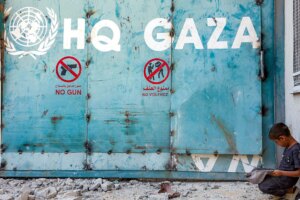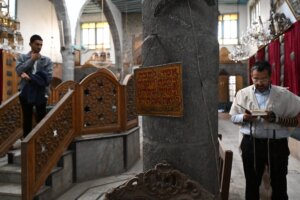
Shafaq News
Iraq’s Sunni political arena is
entering one of its most competitive phases ahead of the parliamentary
elections on November 11, 2025. With the western and northern provinces in
play, the contest is no longer only about representation but about leadership,
influence, and reshaping the Sunni political map.
More than five major parties are
contending for dominance, including established coalitions such as the Progress
(Taqaddum) Party, Al-Azm* (Determination Party), and Iraq’s Sovereignty
Alliance (Al-Siyada), alongside emerging blocs like Nineveh for Its People
(Ninawa Li Ahliha) and the National Resolve Alliance (Al-Hasm Al-Watani).
Analysts estimate these Sunni
alliances could collectively secure over 70 parliamentary seats, signaling both
continuity and disruption in Iraq’s Sunni politics.
Read more: Sunni political alliances shift as Iraq prepares for November elections
Unity Deferred
Sunni representation in Iraq’s
post-2003 political system has been shaped by cycles of marginalization,
reconfiguration, and resurgence. Following the ISIS territorial takeover in
2014, which devastated Sunni heartlands, Sunni factions experienced a marked
decline in influence.
In the 2018 parliamentary elections,
Sunni MPs secured only 73 of 329 seats—a sharp fall from the 90 seats held in
the previous cycle. That figure rose to roughly 94 in 2021, but gains were
short-lived as internal divisions continued to fragment Sunni representation.
In January 2022, two major
camps—Taqaddum and Al-Azm—formed a combined bloc of 71 seats, but unity proved
short-lived as Taqaddum later withdrew over strategic and leadership
differences, halting the coalition’s momentum.
A renewed consolidation effort
emerged in January 2025 with the formation of the Unified Sunni Leadership
Coalition (Ittihad Al-Qiyada Al-Sunniya Al-Muwahhada), bringing together former
Parliament Speaker Mahmoud al-Mashhadani, Al-Siyada’s Khamis al-Khanjar,
Al-Azm’s Muthanna al-Samarrai, National Masses Party (Al-Jamaheer Al-Wataniya)
leader Ahmad al-Jubouri, and the Initiative (Al-Mubadara) bloc of Ziad
Al-Janabi.
The alliance notably launched
without al-Halbousi’s participation, reflecting enduring rivalry within the
Sunni sphere. Despite its high-profile formation, the coalition has yet to
convert its establishment into a coherent electoral strategy or policy program.
Speaking to Shafaq News, political
researcher Muhannad al-Rawi highlighted that these cycles reflect not only
personal and tribal rivalries but also competing visions of governance, ranging
from traditional networks to technocratic and reformist approaches.
Read more: Iraq’s 2025 elections: Five major Sunni alliances ignite the race
Al-Halbousi’s Empire
Former Parliament Speaker Mohammed
al-Halbousi leads Taqaddum, the largest Sunni coalition, fielding candidates
across key Sunni-majority provinces. The alliance encompasses Qimam (Tahaluf
Qimam) led by Khaled Battal, al-Anbar Huwiyatuna under Ali Farhan al-Dulaimi,
and the Leadership Coalition in al-Anbar (Ittihad al-Qiyada) headed by Khalil
al-Dulaimi.
Taqaddum is projected to win between
27 and 30 seats nationwide, dominating al-Anbar—where it could secure 90% of
seats—and capturing four to five in Nineveh. Its stronghold extends to Baghdad,
Diyala, and Saladin, reflecting al-Halbousi’s strategy of combining tribal,
ministerial, and urban support.
Key figures reinforcing the alliance
include Culture Minister Ahmed al-Fakkak, Industry Minister Khaled Battal,
former Agriculture Minister Falah Zidan, and former Education Minister Ali
Hamid.
Historically, Taqaddum has
experienced notable fluctuations. After winning 19 seats in 2018, it rose to 37
in 2021 amid growing dissatisfaction with older coalitions. This trajectory is
attributed to al-Halbousi’s consolidation of administrative influence and
alliances with tribal leaders.
Legal challenges, such as the 2023
court ruling removing al-Halbousi from his Speaker seat over fraud allegations,
have however, introduced uncertainty, particularly in northern provinces.
Al-Samarrai’s Surge
Muthanna al-Samarrai’s Al-Azm
coalition is emerging as the main competitor to Taqaddum, fielding around 300
candidates across Sunni provinces. Its campaign focuses on Baghdad, Diyala,
Kirkuk, Mosul, Ramadi, and Saladin, according to the party’s official Muzaffar
al-Karkhi.
The alliance combines experienced
politicians, including Mahmoud al-Qaisi, Raad al-Dahlaki, and Najat al-Taie,
with influential tribal leaders, establishing a strong presence in key
constituencies.
Al-Azm’s leader, Ghanem al-Aifan,
emphasized to Shafaq News that the party’s inclusive governance and reformist
agenda would let the party capture at least 20 seats even under conservative
projections.
A relatively new player in Iraq’s
political arena, Al-Azm did not participate in the 2018 parliamentary
elections. It made its debut in 2021, winning 14 seats and signaling its
potential to challenge established Sunni blocs. Since then, it has steadily expanded
support, tapping into voter fatigue with traditional parties.
In al-Anbar, Al-Azm could secure
three to four seats, challenging Taqaddum’s near-monopoly. Analysts expect the
margin between Taqaddum and Al-Siyada to be around five seats, with Taqaddum
likely leading in al-Anbar, Al-Azm favored in Saladin, and a tight contest in
Diyala. The competition is particularly intense in Saladin and Diyala, where
both coalitions are contending for the same tribal and urban constituencies.
The rivalry reflects deeper
strategic and ideological divisions, with al-Aifan noting that “Al-Azm seeks to
position itself as a centrist bloc bridging Sunni political divides and
reasserting influence in the national legislature, while Taqaddum relies on
state influence and tribal consolidation.”
Al-Khanjar’s Stand
Khamis al-Khanjar, leader of the Azm
Party, heads Iraq’s Sovereignty Alliance (Al-Siyada), a Sunni political
coalition projected to secure 8–10 seats nationwide. The alliance retains
influence in Diyala and Baghdad but faces pressure from the organizational
strength of rivals such as Taqaddum and Al-Azm.
Al-Siyada’s past performance
illustrates these challenges. The coalition won 12 seats in 2018 but dropped to
7 in 2021 as newer alliances and locally entrenched parties siphoned support.
Earlier this year, al-Khanjar joined
other Sunni figures, notably current Parliament Speaker Mahmoud al-Mashhadani,
to form the Unified Sunni Leadership Coalition, aiming to appeal to moderate
urban Sunni voters disenchanted with traditional factions.
Al-Mashhadani, a seasoned politician
who also led parliament from 2006 to 2009 under the Iraqi Accordance Front
(Jabhet Al-Tawafuq Al-‘Iraqiyah), brings extensive experience to the coalition.
Although he ran in the 2018 and 2021 elections, he did not win a parliamentary
seat.
The coalition is leveraging
al-Mashhadani’s political stature to advance a platform centered on
technocratic governance and Sunni-Shiite dialogue, integrating former civil
servants and professionals to challenge dominant tribal- and personality-driven
politics.
Efforts also aim to include younger
voices and grassroots movements on campaign lists. While currently limited in
reach, these initiatives reflect a broader generational shift emerging across
Iraq’s political landscape.
Read more: The uncivil war: Iraq’s election frenzy
New Faces Rise
Several rising blocs are further
reshaping Iraq’s Sunni political map. Nineveh for Its People (Ninawa Li
Ahliha), led by Sheikh Abdullah Ajeel al-Yawar, is poised to dominate Nineveh
province, targeting six to seven seats. Its strength derives from local tribal
leadership and a focus on provincial governance.
The National Resolve Alliance
(Al-Hasm Al-Watani), headed by Defense Minister Thabit Al-Abbasi, is contesting
in Nineveh, al-Anbar, Baghdad, Saladin, and Diyala, with projections of six to
eight seats nationwide.
Meanwhile, the National Identity
Party (Al-Huwiya Al-Wataniya), guided by Sunni politician Omar Namik Al-Mulla
and fronted by Christian figure Rayan al-Kaldani, is expected to secure three
to four seats in Nineveh, highlighting Iraq’s growing political pluralism and
cross-sectarian coalitions.
These emerging blocs are reshaping
the Sunni political landscape, challenging the dominance of Taqaddum and Al-Azm
while introducing new generational and local leadership dynamics into the
electoral process.
Coalition Crossroads
Most observers anticipate that,
despite intense intra-Sunni competition, coalitions will eventually need to
collaborate to form parliamentary blocs and negotiate government positions.
They forecast a reconfiguration of Sunni alliances shaped by provincial
influence, historical performance, and the rise of new leaders.
“The fight is not just for seats—it
is for the soul and direction of Iraq’s Sunni House,” al-Rawi concluded, noting
that whoever consolidates authority now will define the community’s political
trajectory for years to come.
The Crossroads of Iraq’s Political
Identity
Beyond sectarian boundaries, both
the Shiite and Sunni political houses stand at a crossroads that will shape
Iraq’s post-2025 order. While their internal rivalries differ in scale and
origin, they mirror one another in motivation: a struggle to balance power,
legitimacy, and governance in a state still rebuilding its cohesion.
Analysts say that the simultaneous
fragmentation of both blocs underscores the end of Iraq’s old political
binaries. The Shiite camp is testing its ability to transform dominance into
stable governance, while the Sunni arena is fighting to convert representation
into lasting influence. In both cases, voters are demanding results—jobs,
services, and accountability—rather than slogans or sectarian mobilization.
Read more: Iraq’s 2025 Elections: Shiite giants clash for Soul of the House
Written and edited by Shafaq News
staff.





